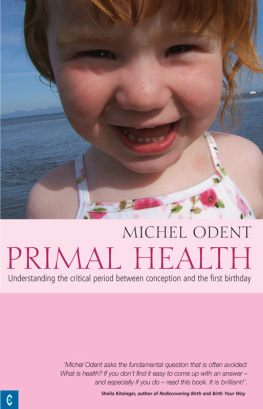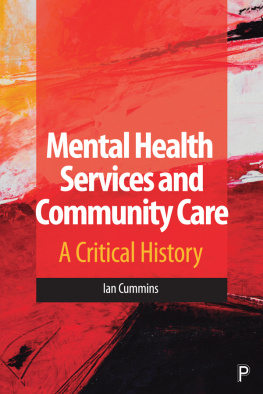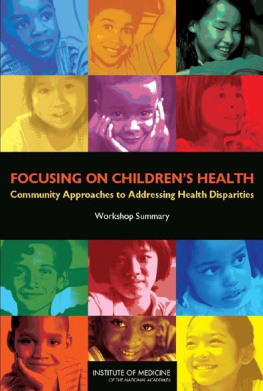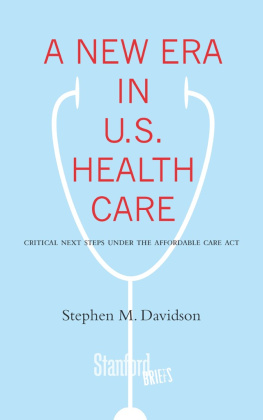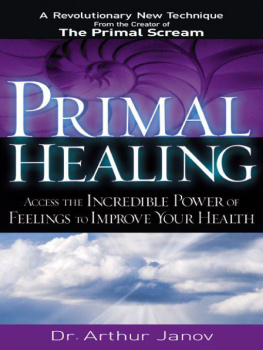MICHEL ODENT, born in 1930 and qualified as a general surgeon, has played multiple and complementary roles in influencing the recent history of childbirth and health research. As a practitioner he developed the maternity unit at Pithiviers (France) in the 1960s and 70s. He is popularly known as the obstetrician who introduced the concepts of birthing pools and homelike birthing rooms. His approach has featured in eminent medical journals such as The Lancet, and in TV documentaries such as the BBC film Birth Reborn. After his hospital career he practised home birth.
As a researcher he founded the Primal Health Research Centre in London, whose objective is to study the long-term consequences of early experiences. An overview of the Primal Health Research Data Bank (www.birthworks.org) clearly indicates that our health is shaped during the primal period (between conception and the first birthday). It also suggests that the way we are born has long-term consequences in terms of sociability, aggressiveness or, otherwise speaking, the capacity to love.
Michel Odent developed a preconceptional programme (the accordion method) in order to minimize the effects of intrauterine and milk pollution by synthetic fat-soluble chemicals such as dioxins, PCBs, etc. He is researching the non-specific, long-term effects on health of early multiple vaccinations.
He is the author of about fifty scientific papers and ten books published in twenty languages.
PRIMAL HEALTH
By the same author:
Entering the World
Birth and Breastfeeding
Birth Reborn
Zinc and Health (co-author)
Water and Sexuality
We Are All Water Babies (co-author)
The Scientification of Love
The Farmer and the Obstetrician
(not in English)
Gense de Lhomme cologique
Les Acides Gras Essentiels
PRIMAL HEALTH
UNDERSTANDING THE CRITICAL
PERIOD BETWEEN CONCEPTION
AND THE FIRST BIRTHDAY
MICHEL ODENT

Clairview Books
Hillside House, The Square
Forest Row, East Sussex
RH18 5ES
www.clairviewbooks.com
Published by Clairview 2012
First published under the title Primal Health, A Blueprint for Our Survival
by Century Huchinson Ltd., London 1986
Michel Odent 2002
Michel Odent asserts the moral right to be identified as the author of this work
All rights reserved. No part of this publication may be reproduced, stored in a retrieval system, or transmitted, in any form or by any means, electronic, mechanical, photocopying or otherwise, without the prior permission of the publishers
A catalogue record for this book is available from the British Library
ISBN 978 1 905570 44 7
Cover photo by Rosalind Faram
Cover design by Andrew Morgan Design
Typeset by DP Photosetting, Aylesbury, Bucks.
This book is dedicated to Antoine Bchamp.
Why Antoine Bchamp?
Not because he understood the mechanism of fermentation before Pasteur.
Not because he knew about germs before Pasteur.
Not because he demonstrated the role of micro-organisms in certain diseases.
But because, in the euphoria of Pasteurs glory, he dared to say:
Instead of trying to determine what abnormal conditions disease is composed of, let us first know the normal conditions which make us healthy.
Contents
Introduction to the Second Edition
This second edition is presented in a scientific context that is radically different from that of the 1980s. In the first edition, published in 1986, we anticipated a new generation of research confirming that our health is to a great extent shaped during the primal period, which includes foetal life, the period surrounding birth and the year following birth. In the 1980s we had to rely mostly on theoretical considerations. It was already clear that our basic adaptive systems - those involved in what we commonly call health - reach their maturity during this primal period. This is the time when they develop, adjust and regulate themselves. We could therefore assume that everything that happens during this period of dependence on the mother has an influence on our basic state of health - our primal health - and will have lifelong consequences. We could also predict that the spectacular advances in computer sciences would facilitate the development of a new generation of research, namely, primal health research. This framework includes all studies exploring correlations between what happens during the primal period and what will happen later on in life. Today the point is not to anticipate a new phenomenon, but to observe its development and to draw preliminary conclusions. Since our aim is to compare the scientific contexts of the mid-1980s and of the beginning of the twenty-first century, it is necessary that the original text is reproduced without any significant alteration.
Many of the concepts introduced in Primal Health became more easily understood in the 1990s. For example, I had underlined the need for a simple term in order to get rid of the artificial separations between the nervous system, the immune system and the endocrine system. I suggested the term primal adaptive system when referring to this network. Today the need for a simplified vocabulary is more obvious than ever. The scientific literature is still burdened with awkward terms such as psycho-neuro-immuno-endocrinologic system.
It is also around 1990 that variants of the hypotheses included in Primal Health appeared in the mainstream medical literature. The foetal origins of disease hypothesis was inspired by the countless studies published by the Barker group, a team of British epidemiologists based in Southampton. It became the foetal/infant origins of disease hypothesis in the mid-1990s. There are obvious similarities between the studies testing the foetal/infant origins of disease hypothesis and primal health research. One of the main differences is that our key word is health instead of disease. This gives an opportunity to stress that my first preoccupation has been to understand the genesis of a good health, rather than to focus on the origins of specific illnesses. Improving our understanding of health may appear more fruitful than studying the origins of particular diseases.
In the late 1980s, in the 1990s and after, there has been an explosion of studies that belong to the framework of primal health research. It is difficult to identify such studies because they are unrelated according to the current classifications. It is like finding a needle in a haystack. For example, it would take a long time to find out that a pregnancy disease such as pre-eclampsia has been studied in relation to health conditions as diverse as prostate cancer, breast cancer, schizophrenia, mental retardation and cerebral palsy. This is the reason for the Primal Health Research Data Bank. Everybody has free access to our bank (www.birthworks.org/primalhealth). The bank contains hundreds of studies that have been published in authoritative medical and scientific journals. A list of key words and a list of authors are offered in order to facilitate the access to the relevant references and abstracts.
An overview of our data bank is offered as a postscript of this new edition. It represents the best way to evaluate the extent of the primal health research phenomenon, to realize its possible effects on our understanding of health and disease, and to anticipate the diversity of the practical implications.
Reference
1 Kramer, M.S.; Joseph, K.S., Enigma of foetal/infant-origins hypothesis, Lancet 348 (1996) pp. 12545
Next page
